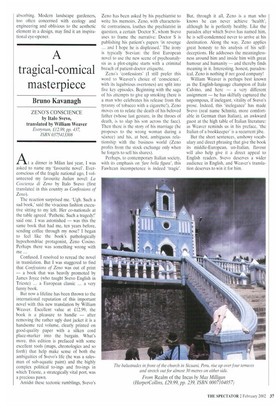A tragical-comical masterpiece
Bruno Kavanagh
ZENO'S CONSCIENCE by Italo Svevo, translated by William Weaver Everyman, £12.99, pp. 437, ISBN 0375413308 At a dinner in Milan last year, I was asked to name my 'favourite novel'. Everconscious of the fragile national ego, I volunteered my favourite Italian novel: La Coscienza di Zeno by Italo Svevo (first translated in this country as Confessions of Zeno).
The reaction surprised me. 'Ugh. Such a sad book,' said the vivacious fashion executive sitting to my left. Her co-nationals at the table agreed. 'Pathetic. Such a tragedy!' said one. I was astonished — was this the same book that had me, ten years before, sending coffee through my nose? I began to feel like the book's pathologically hypochondriac protagonist, Zeno Cosino. Perhaps there was something wrong with me .., Confused, I resolved to reread the novel in translation. But I was staggered to find that Confessions of Zeno was out of print — a book that was heavily promoted by James Joyce (who taught Svevo English in Trieste) ... a European classic ... a very funny book.
But now a lifeline has been thrown to the international reputation of this important novel with this new translation by William Weaver. Excellent value at £12.99, the book is a pleasure to handle — after removing the rather ugly dust jacket it is a handsome red volume, clearly printed on good-quality paper with a silken cord place-marker into the bargain. What's more, this edition is prefaced with some excellent tools (maps, chronologies and so forth) that help make sense of both the ambiguities of Svevo's life (he was a salesman of sub-aquatic paint) and the highly complex political to-ings and fro-ings in which Trieste, a strategically vital port, was a precious pawn.
Amidst these tectonic rumblings, Svevo's Zeno has been asked by his psychiatrist to write his memoirs, Zeno, with characteristic contrariness, loathes the psychiatrist in question, a certain 'Doctor S', whom Svevo uses to frame the narrative: Doctor S is publishing his patient's papers 'in revenge ... and I hope he is displeased.' The irony is typically Svevian: the first European novel to use the new scene of psychoanalysis as a plot-engine starts with a criminal breach of patient-doctor etiquette.
Zeno's 'confessions' (I still prefer this word to Weaver's choice of 'conscience', with its lugubrious overtones) are split into five key episodes. Beginning with the saga of his attempts to give up smoking (here is a man who celebrates his release from the tyranny of tobacco with a cigarette!), Zeno moves on to relate the death of his beloved father (whose last gesture, in the throes of death, is to slap his son across the face). Then there is the story of his marriage (he proposes to the wrong woman during a séance) and his, at best, ambiguous relationship with the business world (Zeno profits from the stock exchange only when he forgets to sell his shares).
Perhaps, to contemporary Italian society, with its emphasis on 'fare bella figura', this Fawltean incompetence is indeed 'tragic'. But, through it all, Zeno is a man who knows he can never achieve 'health', although he is perfectly healthy. Like the paradox after which Svevo has named him, he is self-condemned never to arrive at his destination. Along the way, Zeno applies great honesty to his analysis of his selfdeceptions. He addresses the meaninglessness around him and inside him with great humour and humanity — and thereby finds meaning in it. Interesting, honest, paradoxical, Zeno is nothing if not good company!
William Weaver is perhaps best known as the English-language champion of Italo Calvin°, and here — a very different assignment — he has skilfully captured the unpompous, if inelegant, vitality of Svevo's prose. Indeed, this 'inelegance' has made Svevo (real name Schmitz, more comfortable in German than Italian), an awkward guest at the high table of Italian literature: as Weaver reminds us in his preface, 'the Italian of a bookkeeper' is a recurrent jibe.
But the short sentences, unshowy vocabulary and direct phrasing that give the book its middle-European, un-Italian, flavour will also help give it a direct appeal to English readers, Svevo deserves a wider audience in English, and Weaver's translation deserves to win it for him.






























































 Previous page
Previous page